Rakuten Bundle
What Drives Rakuten's Global Success?
Understanding a company's mission, vision, and core values is key to grasping its strategic direction and potential for growth. These foundational elements shape a company's culture, guide its decisions, and define its impact on the world. Let's delve into the core principles that fuel Rakuten Company's remarkable journey.
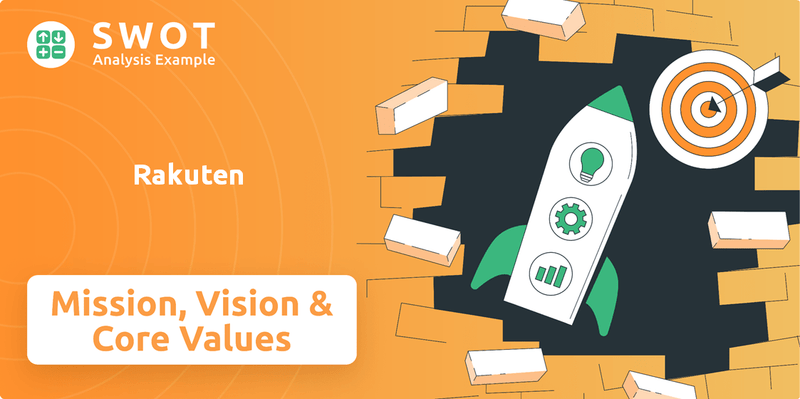
Rakuten, a global powerhouse in internet services, operates a diverse ecosystem, and its guiding principles are crucial to its success. This exploration of Rakuten's mission, vision, and core values provides valuable insights for investors, business strategists, and anyone interested in understanding the Rakuten SWOT Analysis. Discover how Rakuten's philosophy shapes its identity and drives its strategic choices in a competitive market, revealing how these elements contribute to its long-term vision strategy.
Key Takeaways
- Rakuten's mission, vision, and values are central to its corporate identity and success.
- The company's mission focuses on empowering people and society through innovation.
- Rakuten Shugi, the core values, promotes a culture of empowerment and teamwork.
- FY2024 financial results show the positive impact of strategic alignment with these principles.
- Adherence to its guiding principles will be crucial for future growth and sustainability.
Mission: What is Rakuten Mission Statement?
Rakuten's mission is 'to contribute to society by creating value through innovation and entrepreneurship, empowering people to realize their hopes and dreams.'
Let's delve into the heart of Rakuten's operations: its mission. Understanding the Rakuten Mission is crucial for grasping the company's direction and its impact on the global market. This mission statement, a cornerstone of the Rakuten Philosophy, is not merely a corporate slogan; it's a guiding principle that shapes every aspect of Rakuten's business, from its e-commerce platform to its fintech services.
The Rakuten Mission is built upon two primary pillars: innovation and empowerment. Rakuten strives to create value through continuous innovation, constantly seeking new ways to improve its services and offerings. Simultaneously, it aims to empower both consumers and businesses, providing them with the tools and opportunities they need to succeed. This is how Rakuten defines its mission.
A key aspect of the Rakuten Mission is its focus on empowering people. This includes providing consumers with access to a wide range of products and services, as well as supporting businesses, particularly small and medium-sized enterprises (SMEs), through its e-commerce platform, Rakuten Ichiba. In 2023, Rakuten Ichiba had over 57,000 merchants, demonstrating its commitment to supporting businesses.
Innovation is central to the Rakuten Mission. The company consistently explores new technologies and business models to enhance its offerings and create value. This commitment to innovation is evident in its diverse portfolio, spanning e-commerce, fintech, digital content, and mobile communications. Rakuten's investment in R&D reached ¥127.8 billion in 2023, underscoring its dedication to innovation.
Rakuten operates on a global scale, with a presence in numerous countries. Its mission is not limited by geographical boundaries; instead, it aims to create value and empower people worldwide. Rakuten's e-commerce business generated a Gross Merchandise Value (GMV) of ¥5.5 trillion in 2023, reflecting its significant global impact. This is a testament to Rakuten's long-term vision strategy.
The Rakuten Mission is evident in its various ventures. For example, Rakuten Ichiba empowers local businesses by providing them with an online platform to reach a wider customer base. Rakuten Bank and Rakuten Securities aim to empower individuals by offering accessible financial services. Furthermore, the company's commitment to its mission is reflected in its strategic decisions and investments.
The Rakuten Mission is closely tied to its growth strategy. By focusing on innovation and empowerment, Rakuten aims to expand its market share and create new opportunities. For a deeper understanding of Rakuten's strategic approach, consider reading about the Growth Strategy of Rakuten. This strategic alignment is crucial for achieving Rakuten's vision for the future.
In conclusion, the Rakuten Mission is a dynamic force, driving the company's actions and shaping its future. It's a commitment to innovation, empowerment, and contributing to society. Understanding this mission is key to appreciating the Rakuten Company's values and its ambitions in the global market. Rakuten's core values examples are deeply rooted in its mission.
Rakuten SWOT Analysis
- Complete SWOT Breakdown
- Fully Customizable
- Editable in Excel & Word
- Professional Formatting
- Investor-Ready Format
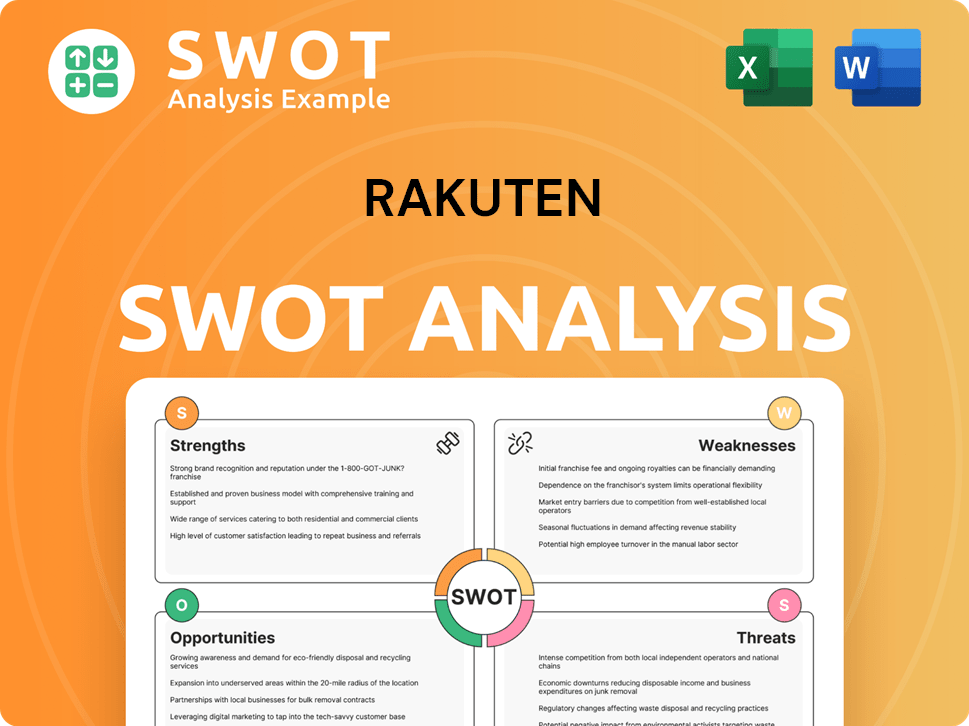
Vision: What is Rakuten Vision Statement?
Rakuten's vision is to be a 'Global Innovation Company'.
The vision of Rakuten, a 'Global Innovation Company,' is a bold declaration of intent. This statement encapsulates Rakuten's ambition to not just participate in the global market but to lead it through technological advancements and market disruption. This vision is not merely about size; it's about fostering a culture of innovation, drawing on knowledge, creativity, and passion from around the world to achieve its goals. This is reflected in their financial performance, with record-high consolidated revenue of 2.3 trillion yen in FY2024, demonstrating the company's ability to execute its vision.
Rakuten aims to disrupt existing industry models. This involves challenging the status quo and creating new value through innovation across its diverse ecosystem. This is a core element of the Rakuten Vision, driving the company's strategic initiatives.
The vision includes a clear ambition for global impact. Rakuten seeks to empower people and build communities. This is about creating environments where individuals can pursue their dreams and live happily. This is a crucial aspect of understanding the Owners & Shareholders of Rakuten.
Rakuten's historical trajectory supports its vision. The company has expanded from e-commerce into fintech, mobile, and other sectors. This diversification showcases its commitment to innovation and its ability to adapt to changing market dynamics.
Rakuten continues to invest in cutting-edge technologies. Areas like AI and 5G are key to its ambition. These investments are critical for maintaining its position as a global innovation leader. This is a strategic move to ensure long-term growth.
The vision is both aspirational and realistic. Rakuten's financial performance in FY2024, with record revenue, indicates its ability to achieve its goals. This balance is crucial for sustained growth and market leadership. This is a key component of the Rakuten Vision.
Understanding Rakuten's core values is essential. These values guide the company's actions and decisions. They are the foundation upon which Rakuten builds its vision. They are a key part of Rakuten's company values explained.
The Rakuten Vision, as a 'Global Innovation Company,' is a comprehensive statement that guides the company's strategic direction, influencing its mission, values, and overall business strategy. It reflects Rakuten's commitment to innovation, global impact, and sustainable growth, shaping its Rakuten Culture.
Rakuten PESTLE Analysis
- Covers All 6 PESTLE Categories
- No Research Needed – Save Hours of Work
- Built by Experts, Trusted by Consultants
- Instant Download, Ready to Use
- 100% Editable, Fully Customizable
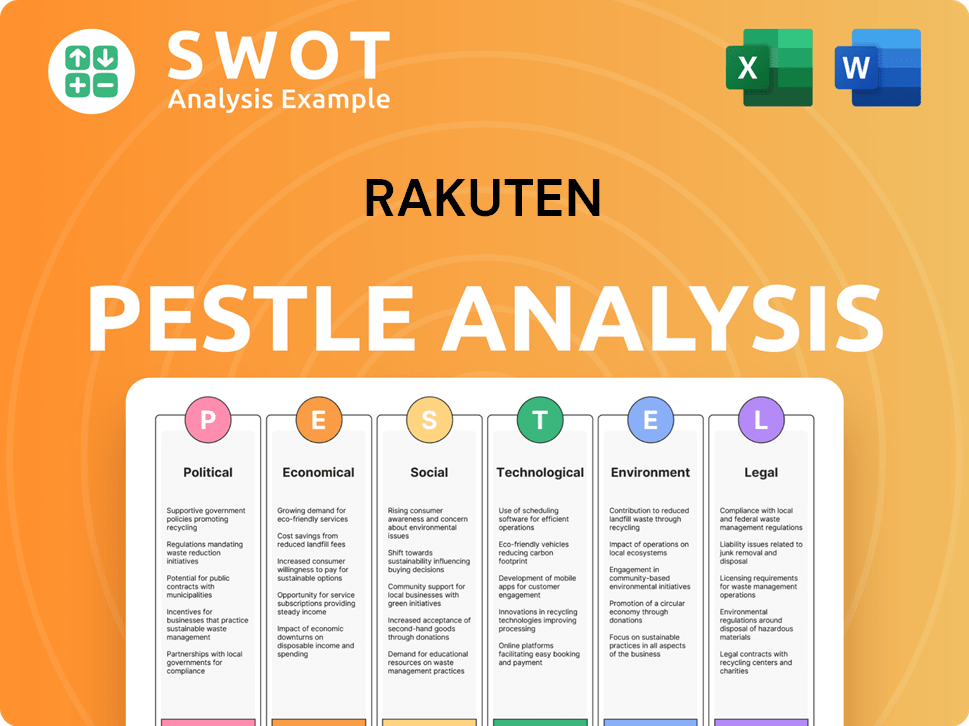
Values: What is Rakuten Core Values Statement?
Understanding the core values of Rakuten, often referred to as 'Rakuten Shugi,' is crucial to grasping its operational ethos and how it shapes its interactions with the world. These values are the bedrock of the Rakuten Company, guiding its employees and influencing its strategic direction.
Empowerment at Rakuten means enabling individuals and businesses to reach their full potential. This value is evident in their support for small and medium-sized enterprises (SMEs) on platforms like Rakuten Ichiba, which hosts over 55,000 merchants as of late 2024. Rakuten strives to provide accessible tools and services, reflecting a commitment to fostering growth for all stakeholders.
Innovation is at the heart of Rakuten's identity, driving the creation of new value and solutions to societal challenges. The company consistently invests in cutting-edge technologies, including AI, to enhance its services. This commitment is visible in the development of AI-powered tools and services across its diverse portfolio, which includes e-commerce, fintech, and mobile communications.
Professionalism within Rakuten emphasizes continuous self-improvement and discipline. This value is reflected in the company's focus on employee development and the expectation that employees consistently enhance their skills and expertise. Rakuten's dedication to professionalism contributes to a culture of excellence and continuous learning across its global operations.
This value underscores the importance of execution and achieving tangible results. Rakuten emphasizes a results-oriented approach, encouraging perseverance in overcoming challenges. This focus on action is crucial for driving the company's strategic initiatives and ensuring it meets its ambitious goals in a competitive market. This is also reflected in their ability to adapt to the ever-changing landscape of the Target Market of Rakuten.
These core values of Rakuten, from its mission to its vision, are the driving force behind its culture and strategic decisions. They shape the company's interactions with customers, partners, and employees. Next, we will explore how Rakuten's mission and vision influence the company's strategic decisions.
How Mission & Vision Influence Rakuten Business?
Rakuten's mission and vision statements are not merely aspirational; they are the bedrock upon which its strategic decisions are built. These guiding principles shape every aspect of the company's operations, from its diversification strategy to its day-to-day interactions with customers and partners.
The core of Rakuten's strategy is directly influenced by its mission to "empower people and society through innovation and entrepreneurship." This mission fuels its diversification, creating a comprehensive ecosystem of interconnected services. This ecosystem aims to offer users a seamless and convenient experience while empowering businesses within the Rakuten network.
- Diversification into Fintech, digital content, and mobile services.
- Focus on creating a connected and convenient user experience.
- Empowering businesses within the Rakuten ecosystem.
- Strategic investments in future technologies and market expansion.
Rakuten's investment in Rakuten Mobile exemplifies its commitment to its mission. Despite initial financial challenges, the venture aligns with the mission of using innovation (cloud-native network) to empower individuals with accessible mobile services and disrupt the telecommunications market. By late 2024 and early 2025, Rakuten Mobile subscribers reached over 8 million.
Rakuten's dedication to innovation is evident in the continuous development and integration of AI across its services. This commitment improves efficiency for internal operations and external partners. This focus aligns with the Rakuten Vision of being a 'Global Innovation Company'.
The growth of Rakuten's fintech services, such as Rakuten Card and Rakuten Bank, directly supports its mission of empowering individuals financially. In 2024, these services saw significant growth in transaction volume and deposit balances. This strengthens the overall ecosystem through cross-usage, creating a more integrated financial experience for users.
The Rakuten Philosophy shapes day-to-day operations by fostering a culture of innovation and a customer-first approach. This is reflected in their product development, customer service, and overall business strategy. This approach is crucial for maintaining customer loyalty and driving long-term growth.
Rakuten's vision of being a 'Global Innovation Company' influences long-term planning. This drives strategic investments in future technologies and market expansion efforts. This vision guides the company's ambition to become a leading global player in various sectors.
Leadership, including CEO Hiroshi Mikitani, consistently communicates the importance of these guiding principles. This reinforces the Rakuten Culture and ensures that all employees understand and embrace the mission and vision. This consistent messaging helps align the entire organization towards common goals.
In conclusion, the Rakuten Mission and Rakuten Vision are not just words; they are the driving force behind the company's strategic decisions, shaping its culture, and guiding its future. The commitment to innovation and customer empowerment is evident in every aspect of the business. For a deeper understanding of how Rakuten navigates the competitive landscape, consider reading our analysis of the Competitors Landscape of Rakuten. Next, we will delve into the core improvements to the company's mission and vision.
Rakuten Business Model Canvas
- Complete 9-Block Business Model Canvas
- Effortlessly Communicate Your Business Strategy
- Investor-Ready BMC Format
- 100% Editable and Customizable
- Clear and Structured Layout
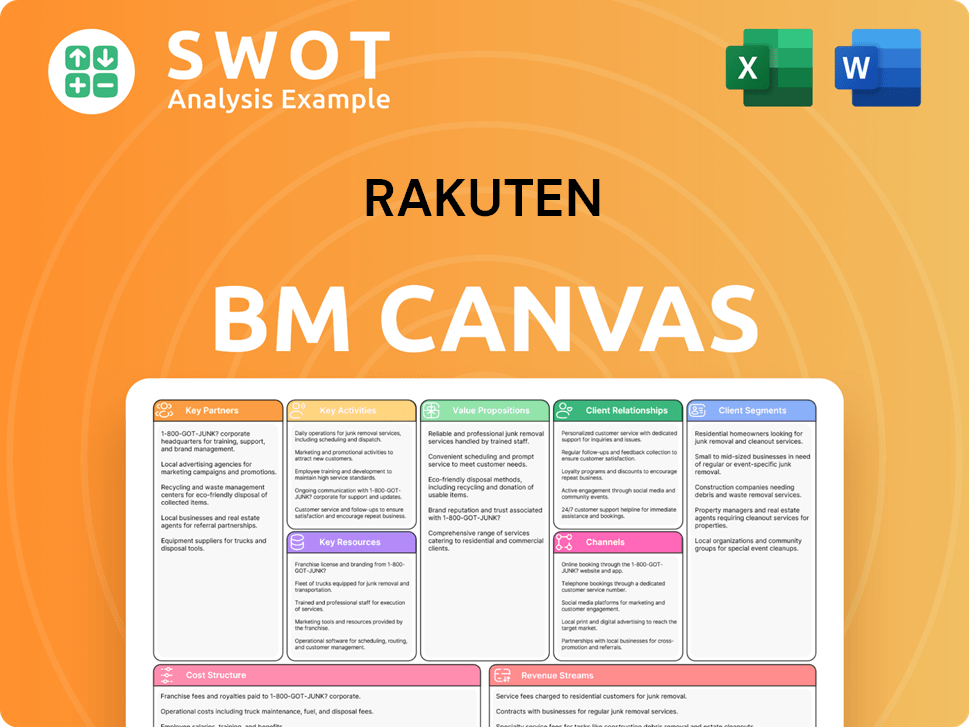
What Are Mission & Vision Improvements?
While Rakuten's foundational statements are solid, there's always room for enhancement to reflect evolving market dynamics and stakeholder expectations. This section explores specific opportunities to refine the Rakuten Mission and Rakuten Vision for greater impact and alignment with emerging trends.
The current Rakuten Mission is comprehensive, but it could benefit from greater conciseness. A more streamlined mission statement could maintain the core message of empowerment and innovation while improving memorability and ease of communication. This would help stakeholders quickly grasp the essence of Rakuten's company values explained and its overall purpose.
Explicitly incorporating sustainability into the Rakuten Mission or Rakuten Vision would underscore the company's commitment to ESG principles. This would align with their actions, such as achieving carbon neutrality for business operations in 2023, and resonate with stakeholders increasingly focused on corporate social responsibility. This also reflects the growing importance of sustainability, with ESG investments reaching trillions of dollars globally.
Given the rapid advancements in AI and other technologies, the Rakuten Vision could explicitly mention leveraging these tools. This would reinforce Rakuten's vision for the future as a leader in technological innovation and demonstrate a forward-thinking approach to achieving its goals. This is particularly relevant, considering the projected growth of the AI market, which is expected to reach hundreds of billions of dollars in the coming years.
While Rakuten's core values examples inherently promote customer satisfaction, explicitly mentioning customer-centricity within the mission or vision could further solidify this focus. This would emphasize the importance of understanding and meeting customer needs in a rapidly changing market. Understanding the customer is also crucial, as explained in our article on Revenue Streams & Business Model of Rakuten.
How Does Rakuten Implement Corporate Strategy?
Implementing a company's mission, vision, and core values is crucial for translating aspirations into tangible actions and fostering a cohesive organizational culture. Rakuten, a global leader in e-commerce and digital services, provides a compelling case study of how these principles are put into practice.
The development and continuous expansion of the Rakuten Ecosystem is a primary example of how the company implements its mission and vision. This interconnected suite of services, encompassing e-commerce, financial technology, digital content, and communications, directly reflects Rakuten's mission of empowering people and businesses.
- Cross-Usage Strategy: Rakuten actively encourages users to utilize multiple services within its ecosystem. For instance, Rakuten Points earned through e-commerce purchases can be used for Rakuten Travel bookings or Rakuten TV subscriptions, fostering customer loyalty and driving overall platform engagement.
- Ecosystem Growth: As of Q1 2024, Rakuten's ecosystem boasts over 1.7 billion registered users worldwide. This growth is a direct result of the successful implementation of their mission and vision.
- Synergistic Benefits: The ecosystem approach allows Rakuten to leverage data and insights across its various services, leading to personalized user experiences and targeted marketing campaigns. This focus on synergy aligns with the vision of creating a unified and user-centric platform.
Leadership plays a pivotal role in reinforcing the Rakuten Mission and Rakuten Vision. CEO Hiroshi Mikitani consistently communicates these principles in company communications and strategic announcements, ensuring they remain at the forefront of the company's focus.
The 'Rakuten Shugi' values, representing the Rakuten Core Values, are actively communicated to employees globally. These values serve as a common foundation for their work and interactions, guiding decision-making and shaping the Rakuten Culture.
Rakuten's diversity and inclusion initiatives are concrete examples of aligning stated values with actual business practices. These initiatives aim to create a workplace where diverse individuals can thrive, reflecting the value of diversity. For example, Rakuten has established employee resource groups (ERGs) to foster inclusivity and provide support for various employee demographics.
Rakuten's customer-first approach, a key component of Rakuten Shugi, is emphasized in their efforts to improve customer satisfaction and provide high-quality services. This customer-centric focus is reflected in their commitment to providing excellent customer support and continuously improving their products and services based on customer feedback.
Rakuten utilizes formal programs and systems to ensure alignment with its mission, vision, and core values. These structured approaches help to reinforce the company's guiding principles across all levels of the organization.
- Asakai (Morning Meetings): The 'Asakai' (morning meetings) are a long-standing tradition aimed at sharing information and aligning employees with company goals and values. These meetings foster a sense of community and ensure that everyone is on the same page.
- Daily Report System: The 'Daily Report' system helps employees track their progress against quantitative goals, reinforcing the 'Get Things Done' value. This system promotes accountability and helps employees stay focused on achieving their objectives.
- Sustainability Strategy and Framework: Rakuten’s sustainability strategy, revised in 2021, and the formulation of a Sustainability Finance Framework in 2024, demonstrate a structured approach to integrating social responsibility into their business practices, aligning with their mission's broader societal contribution goal. This commitment to sustainability is increasingly important to stakeholders.
In conclusion, Rakuten's commitment to its mission, vision, and core values is evident in its multifaceted approach to implementation. From the development of its interconnected ecosystem to the emphasis on leadership communication, diversity initiatives, customer focus, and formal programs, Rakuten demonstrates a comprehensive strategy for aligning its actions with its guiding principles. To delve deeper into the foundational elements of Rakuten's success, explore the Mission, Vision & Core Values of Rakuten.
Rakuten Porter's Five Forces Analysis
- Covers All 5 Competitive Forces in Detail
- Structured for Consultants, Students, and Founders
- 100% Editable in Microsoft Word & Excel
- Instant Digital Download – Use Immediately
- Compatible with Mac & PC – Fully Unlocked
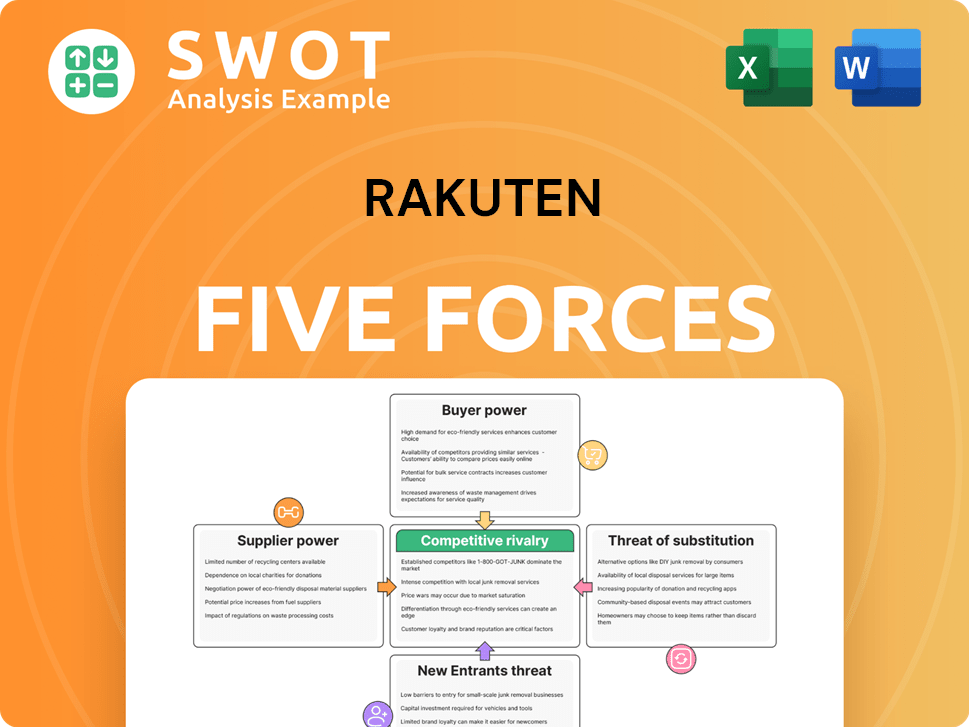
Related Blogs
- What are Mission Vision & Core Values of Rakuten Company?
- What is Competitive Landscape of Rakuten Company?
- What is Growth Strategy and Future Prospects of Rakuten Company?
- How Does Rakuten Company Work?
- What is Sales and Marketing Strategy of Rakuten Company?
- Who Owns Rakuten Company?
- What is Customer Demographics and Target Market of Rakuten Company?
Disclaimer
All information, articles, and product details provided on this website are for general informational and educational purposes only. We do not claim any ownership over, nor do we intend to infringe upon, any trademarks, copyrights, logos, brand names, or other intellectual property mentioned or depicted on this site. Such intellectual property remains the property of its respective owners, and any references here are made solely for identification or informational purposes, without implying any affiliation, endorsement, or partnership.
We make no representations or warranties, express or implied, regarding the accuracy, completeness, or suitability of any content or products presented. Nothing on this website should be construed as legal, tax, investment, financial, medical, or other professional advice. In addition, no part of this site—including articles or product references—constitutes a solicitation, recommendation, endorsement, advertisement, or offer to buy or sell any securities, franchises, or other financial instruments, particularly in jurisdictions where such activity would be unlawful.
All content is of a general nature and may not address the specific circumstances of any individual or entity. It is not a substitute for professional advice or services. Any actions you take based on the information provided here are strictly at your own risk. You accept full responsibility for any decisions or outcomes arising from your use of this website and agree to release us from any liability in connection with your use of, or reliance upon, the content or products found herein.